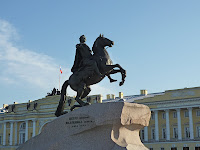On a shore by the desolate waves
He stood, with lofty thoughts,
And gazed into the distance . . .
–Pushkin, The Bronze Horseman
St. Petersburg has almost mythical origins; out of a swamp Peter the Great personally willed a fantastic city into being. It's like a story you read in a museum next to some antiquated city blueprints: Quasi-delusional military leader envisions an ideal European city over a swamp but dies tragically dies before realizing his vision. Except that Peter the Great didn't die early, and didn't really have to convince anyone that his proposal was good or reasonable – he just said the word and his fantastical plans became reality.
The Bronze Horseman statue, commissioned well after Peter's death by Catherine the Great, became, with Pushkin's help, a symbol of Russian progress. Peter urges his horse ahead - or is he trying to stop? "A city hewn in stone is never wholly safe from the incursions of the watery chaos from which was claimed," Orlando Figes points out, "and this sense of living on the edge was wonderfully conveyed by [its sculptor] Falconet." He tells a great story – almost too good to seem true – about how a commission inspected the giant statue in 1909. They drilled holes in it and collected 1500 liters of water from the inside. Its history, its origins are inescapable.
Though you can't exactly tell from the picture, the statue is just gigantic. According to Figes, the granite base for the statue weighed 660,000 kilos and took 1000 men 18 months to transport 13 kilometers from a nearby forest. Peter and his horse are about 12 meters tall and 30 meters around. Though not generally an expensive statue enthusiast, after walking around STP (or, in local parlance, just "Peter") for a few days, I'm pretty convinced this was well-deserved.
*Most of what I currently know about Russia and all of what I have quoted above comes from Orlando Figes's really great cultural history of Russia, Natasha's Dance (Picador, 2002).



2 comments:
What is all this talk of kilos and meters? Somebody's becoming a bit too Europeanized, methinks.
Time to come home!
Post a Comment